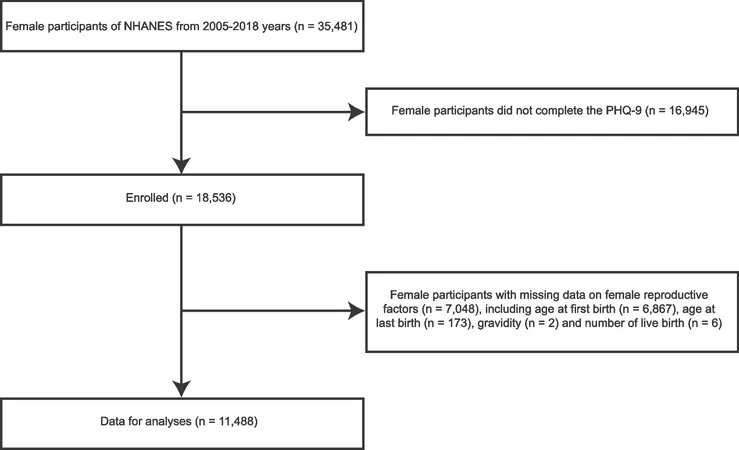
Shocking Link Discovered Between Reproductive Factors and Depression in Women: NHANES Findings Uncovered!
2024-10-10
Author: Rajesh
New Insights into Female Mental Health
A new study has revealed a significant connection between key reproductive factors—such as the age at first birth (AFB) and the number of pregnancies—with the prevalence of depression among women in the United States. This groundbreaking research, utilizing data from the National Health and Nutrition Examination Survey (NHANES) collected between 2005 and 2018, aims to shed light on the complex interplay between reproductive health and mental well-being.
Research Methods: A Deep Dive
In total, the study analyzed the health data of 11,488 women aged 20 and older. The researchers assessed various reproductive factors along with symptoms of depression, measured using the Patient Health Questionnaire-9 (PHQ-9). A score of 10 or higher indicated major depressive disorder. The investigation employed advanced statistical techniques, including weighted multivariable logistic regression and restricted cubic splines (RCS), to explore these associations comprehensively.
Startling Statistics
Among the women studied, approximately 11.6% (1,332 participants) reported experiencing depression. Notably, those who had their first child later in life had a significantly reduced risk of depression. Women who had their first child at ages 21-23, 24-26, and 27-29 showed adjusted odds ratios (ORs) of 0.83, 0.75, and 0.69 for depression, respectively, compared to those who gave birth before 18. Conversely, women with five or more pregnancies experienced a heightened prevalence of depression, with an OR of 1.20 compared to those who had two or fewer.
What the Numbers Mean
The study's findings point to a critical, L-shaped relationship between AFB and depression, indicating that later life pregnancies might shield women from depressive symptoms. Moreover, the analysis highlighted that while higher gravidity and number of live births correlated with increased depression, the relationship between age at last birth (ALB) and depression remained less defined.
The Bigger Picture of Female Mental Health
Around the globe, the rates of depression are rising dramatically, affecting about 280 million individuals. This condition is particularly concerning among women, as studies have shown that depressive episodes tend to last longer and recur more frequently in females than in males. With suicide rates drastically climbing among those affected by depression, understanding the underlying causes becomes vital.
Previous research hinted at a U-shaped relationship between AFB and depression, underscoring the necessity for further investigation into how reproductive factors might influence mental health. Allegedly, earlier and later childbearing can both elevate depressive symptoms, showcasing the importance of context, social factors, and individual circumstances.
Implications and Future Directions
The implications of these findings are stark. As reproductive factors are intertwined with women's mental health, they should be included in screening and preventive strategies for depression. This highlights an urgent need for healthcare professionals to consider reproductive history when addressing mental health issues in women.
Research has also pointed to the significant impact of hormonal changes, particularly during perimenopause, on mental health. As many women navigate the complexities of reproductive decisions alongside mental health challenges, accessible resources and research-backed strategies for support are crucial.
In conclusion, these findings not only contribute valuable insights to ongoing discussions around women’s health but also emphasize the need for tailored interventions considering reproductive histories. This vital research serves as a call to action for mental health professionals, policymakers, and healthcare providers to prioritize female reproductive health in the fight against depression.
Stay tuned for more updates and in-depth analysis on this pressing issue, and don’t miss out on the discoveries that could shape the future of women’s mental health care!

 Brasil (PT)
Brasil (PT)
 Canada (EN)
Canada (EN)
 Chile (ES)
Chile (ES)
 España (ES)
España (ES)
 France (FR)
France (FR)
 Hong Kong (EN)
Hong Kong (EN)
 Italia (IT)
Italia (IT)
 日本 (JA)
日本 (JA)
 Magyarország (HU)
Magyarország (HU)
 Norge (NO)
Norge (NO)
 Polska (PL)
Polska (PL)
 Schweiz (DE)
Schweiz (DE)
 Singapore (EN)
Singapore (EN)
 Sverige (SV)
Sverige (SV)
 Suomi (FI)
Suomi (FI)
 Türkiye (TR)
Türkiye (TR)